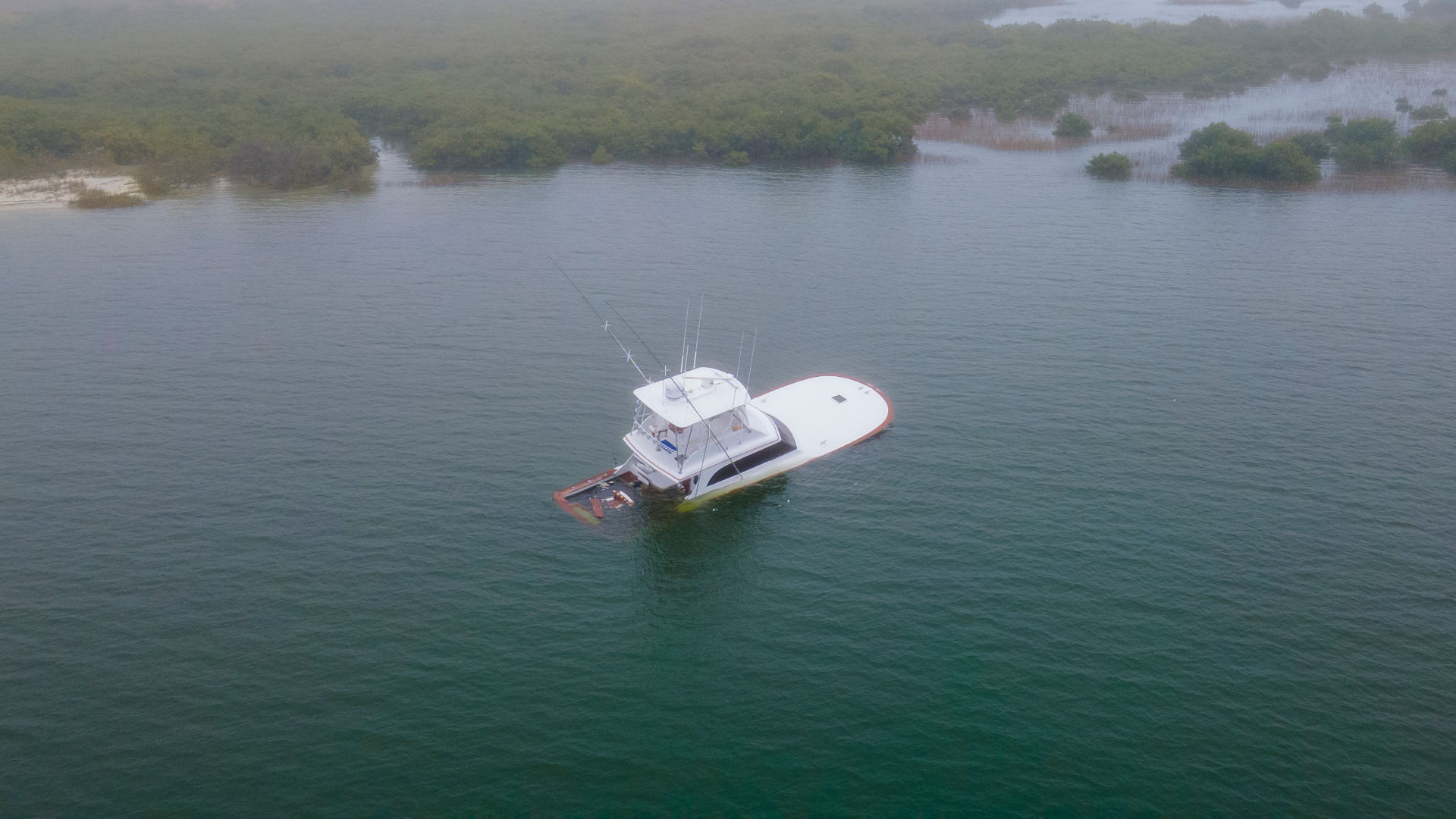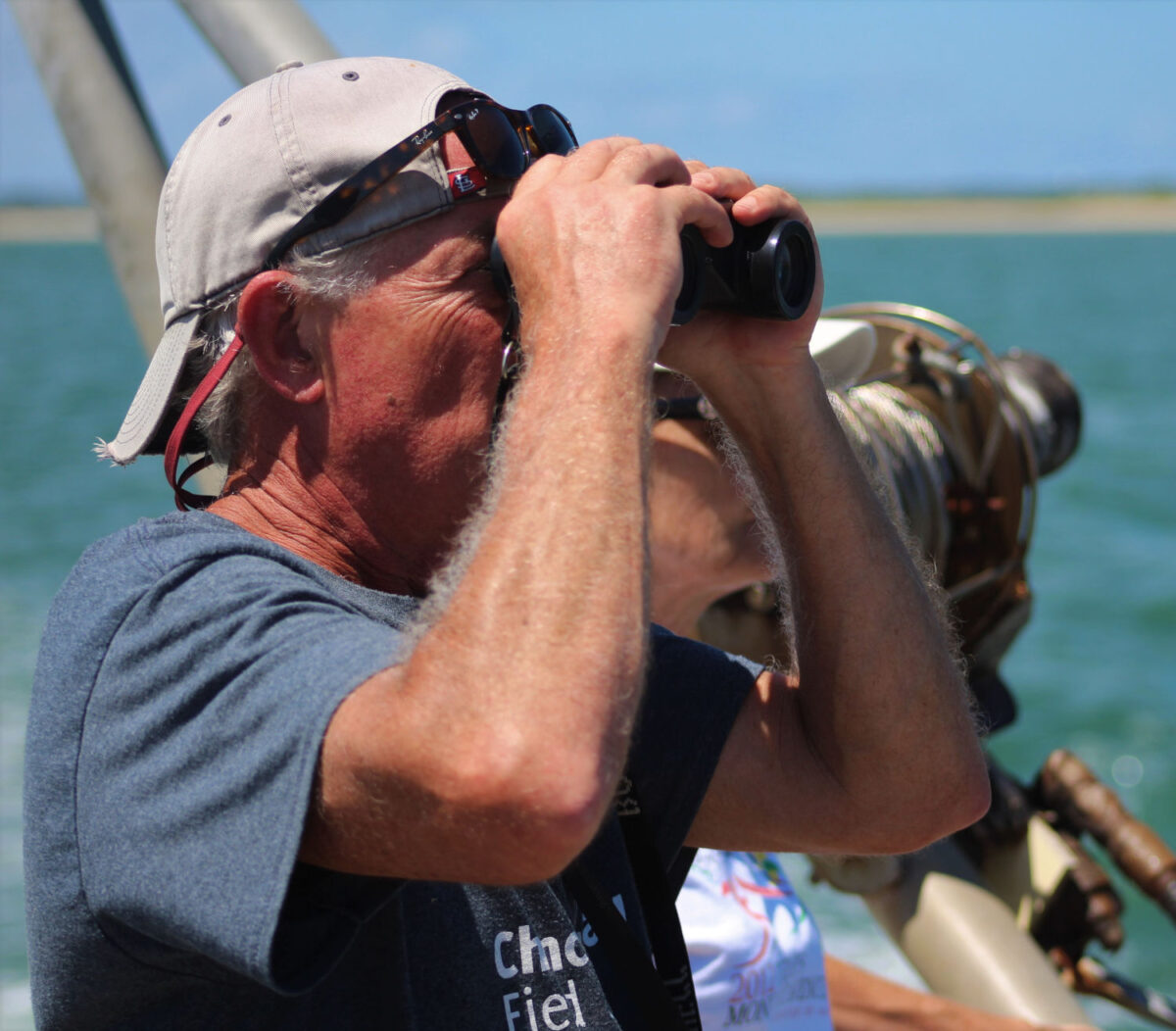Top: A North Atlantic right whale calf, about a month old, was killed by a sportfishing yacht in February 2021. That year, it was estimated that the whales' population had dropped to 340 members. Visual: Tucker Joenz/FWC/NOAA Fisheries permit #18786
Proposed, science-backed speed limits could save whales. But boating advocates push back, citing economic impacts.
BY DARREN INCORVAIA
ALONG THE EASTERN COAST of North America, North Atlantic right whales and boats navigate the same waters, which can get dicey for both. Fully grown, the whales can top out at more than 50 feet and weigh 140,000 pounds. A midsize, 58-foot-long pleasure yacht weighs about 80,000 pounds and can cost more than $1 million. "No mariner wants to collide with a whale," said retired Coast Guard officer Greg Reilly. "For obvious reasons."
Still, the North Atlantic right whale is particularly vulnerable to boat strikes. Since 2017, the large whales have been increasingly found dead off the eastern United States and Canada, often after getting hit by a vessel. In response, in 2017, NOAA Fisheries declared an Unusual Mortality Event for the species, which under the Marine Mammal Protection Act "demands immediate response."
The whales kept dying. By 2021, only an estimated 340 remained. The next year, NOAA Fisheries proposed changes to speed limits that are meant to reduce boat-whale collisions. The proposal would implement a mandatory speed limit of 10 knots in places where whales are spotted, and, for the first time, impose speed restrictions on many recreational and commercial fishing boats.
There is strong science documenting the plight of the right whales and the connection between boat speed and deadly collisions. But opposition from industry groups and fishing advocates, as well as potential difficulties with implementation and enforcement, may stall the new rules — if they get approved at all.

In February 2021, a 54-foot sportfishing yacht in Florida struck a North Atlantic right whale mother-calf pair. The calf was killed, the mother was severely injured, and the $1.2 million boat was totaled. Visual: Tucker Joenz/FWC/NOAA Fisheries permit #18786
According to Kathleen Collins, marine campaign manager at the International Fund for Animal Welfare, a global nonprofit, pushback from the recreational boating sector has already slowed attempts to lower the speed limit. In December, several nonprofits filed emergency petitions with NOAA Fisheries and the Department of Commerce to enact new speed limits as a placeholder until the full rules could be approved, but in mid-January 2023, the Biden administration rejected the request.
The petitions didn't fail because of a "lack of scientific understanding of right whales," Collins said, but because industry groups lobbied lawmakers, primarily out of concerns for their members' livelihoods. Mike Leonard, vice president of government affairs for the American Sportfishing Association — a trade organization representing sportfishing manufacturers, retailers, wholesalers, and media — confirmed via email that the group shared concerns about the proposed speed rules with members of Congress.
Another group opposing the proposed rules is the Recreational Fishing Alliance, which published a letter against the amendments, and encouraged its members to leave public comments. The RFA's website says it is a "grassroots political action organization" meant to protect the rights of recreational fishers; however, its board is made up of boating and fishing industry executives, and it was founded by Bill and Bob Healey, who founded the yacht manufacturer Viking Yacht Company. The current RFA chairman is Bob Healey Jr., the current chairman of Viking Group. The RFA did not respond to an emailed request for comment, and several calls to the group went unanswered.
NOAA Fisheries told Undark a decision on the proposed changes is forthcoming in 2023. In an email, spokesperson Katie Wagner wrote that the agency is "prioritizing efforts to develop effective, long-term North Atlantic right whale vessel strike reduction measures."
ANY WHALE CAN BE the victim of a vessel strike, but North Atlantic right whales are especially vulnerable because they tend to spend time near the coast and at the water's surface. Hunted to near extinction in the late 1800s by whalers who called them the "right" whales to kill for being such easy targets, the population didn't recover after whaling was banned in 1971.
By 1972, the species was listed for protection in the U.S. under the Endangered Species Act and the Marine Mammal Protection Act, with enforcement falling under NOAA Fisheries.

Gregory Silber searches for dolphins while teaching a summer course on marine mammals. Silber spent many years studying North Atlantic right whales, focusing on vessel strikes. Visual: Courtesy Gregory Silber/Chincoteague Bay Field Station
Gregory Silber worked as the national coordinator of recovery activities for large whales at NOAA Fisheries from 1997 to 2017, following a five-and-a-half year stint with the Marine Mammal Commission, an independent government agency created by the Marine Mammal Protection Act in 1972. "About 80 to 90 percent of my time was spent on North Atlantic right whales," Silber said, "because of their dire situation." Right whales are most at risk from entanglement in commercial fishing gear and from being struck by boats. Because of the powerful fishing lobby and the complexity of the entanglement issue, Silber said, he felt his best bet was to focus on vessel strikes...
more...
https://undark.org/2023/03/29/recreational-fishing-industry-wont-slow-down-for-right-whales/

F. Kaskais Web Guru
No comments:
Post a Comment